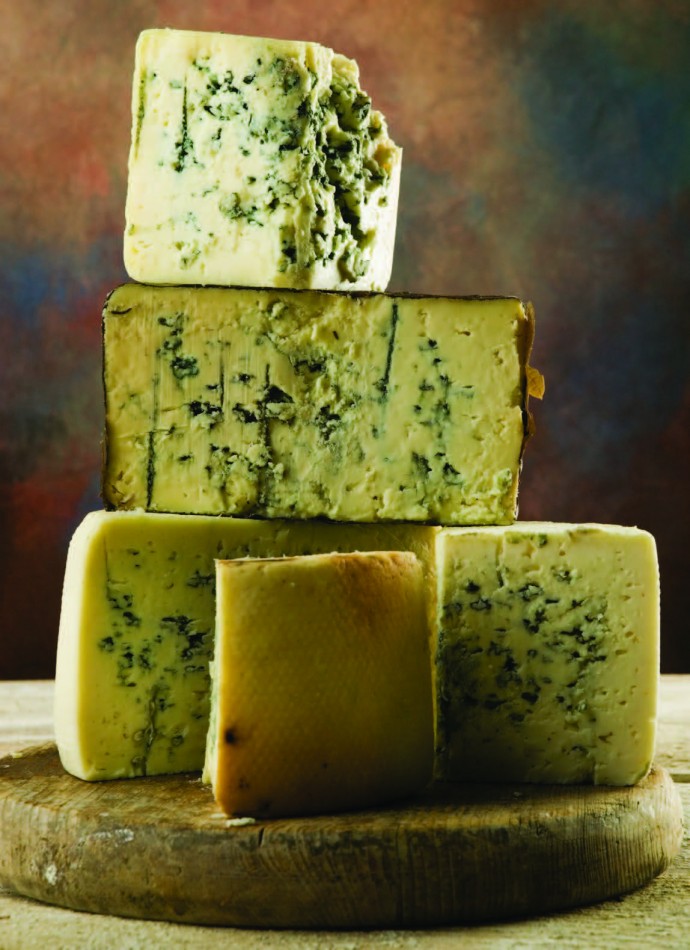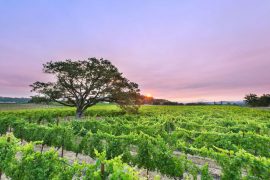On an 84-acre farm in Bend, a herd of French and Swiss breeds of goats are roaming in the crisp air of the Cascades mountains. Flavio DeCastilhos, founder of Tumalo Farms, goes about making goat cheese by hand.
Because DeCastilhos makes his cheese at the farm with fresh milk right from the animals, it is classified as farmstead cheese, one of the cheese’s highest designations. Under the farmstead designation, the cheese maker has complete control over the milk quality and therefore the cheese. Most consumer cheese, by contrast, is created through a process where the milk arrives by truck from a number of farms and states.
In farmstead cheese-making, the animal’s environment is the key to the cheese taste—from the air the goats breathe to the local orchard grass and alfalfa they eat, to the water they drink, says DeCastilhos. The environment, the terroir, pleases the palate, he says. Like the peat of a scotch or the region of a wine, with farmstead cheese you’re savoring the land that nurtured the product.
“It goes back to the whole slow food movement. They take their time with small batches and are very particular about it. Overall, it’s a better product.
— Sam Reed, 10 below
Unrelenting care of the animals is crucial. “It all revolves around their health and feeding—like having a bunch of babies,” says DeCastilhos who has two teenage sons and 700 goats—the latter mammals free of antibiotics and hormones.
DeCastilhos ages the cheese in a high-tech cellar he built into the side of a hill, constantly monitoring and adjusting controls until the cheese is perfect.
It was that taste that last year catapulted Tumalo Farms into the national spotlight. Its Classico Hard Goat’s Milk Cheese scooped second place in the U.S. Championship Cheese Contest, considered the Academy Awards for American cheese-makers. It was the first time an Oregon farmstead cheese placed in the top three and rare for a goat cheese to finish on the podium.
It was a good year for Oregon cheese, as Tillamook took first place for its medium cheddar. That acknowledgment supports what Oregon cheese-mongers, cheese-makers, chefs and cheese nerds have known for years. “Oregon is on the national map as a hotbed of creativity and a real resource for high quality products,” notes Christine Hyatt, president of the board of the Denver-based American Cheese Society. About a decade ago, Oregon had one farmstead and one artisan cheese-maker: Juniper Grove Farm in Redmond and Rogue Creamery in Central Point.
“Artisan” cheese-making is similar to farmstead cheese-making in its small-scale, handmade cheeses with the highest quality milk and ingredients, but differs in that artisan cheese is not made at the farm where the milk is produced. Within the past five years, however, the number of farmstead and artisan cheese-makers has grown to about two dozen in the state.
“There’s absolutely the locavore factor,” says Hyatt. “Another big factor is that Oregon winters are not as harsh as the traditional dairies of the Midwest.”The time-tested Rogue Creamery has been making cheese by hand in the same way since 1935. That has become particularly popular with consumers, says Francis Plowman, the creamery’s marketing manager. People want to be more in touch with the people who make their food. “In the last five years, I’ve seen an increase in people wanting to know where the cows are from, what they eat, and do we use hormones,” he says. Rogue Creamery uses milk from a single source, Rogue View Dairy, which does not use growth hormone supplements.
Rogue Creamery has drawn attention to Oregon cheeses through numerous awards, including taking First Place Blue Cheese in the 2010 American Cheese Society Awards, and winning, in 2003, the World’s Best Blue Cheese at the World Cheese Awards in London, a first for a U.S. creamery.
At southeast Portland’s Cheese Bar, connoisseur and proprietor Steve Jones counts Rogue Creamery among the nearly 200 types of cheese at his deli. He enjoys helping patrons pair their selections with more than fifty brews and wines. Yet as much experience as Jones has with cheese, he has trouble picking one Oregon artisan creamery or cheese that excites him the most.
“Oh man, there are just so many,” says Jones, who has been a cheese-monger for the past fifteen years and a judge at the 2010 American Cheese Society. Juniper Grove and Rogue Creamery keep innovating, he says. Yet, he concedes, the Tumalo Farms’ Pondhopper, a tangy Dutch gouda style goat cheese made with a local microbrew, makes “the perfect balance of cheese and beer.”
Jones rattles off a list of artisan creameries that come to mind: Ancient Heritage Dairy, a sheep and cow dairy in Scio; Willamette Valley Cheese Company in Salem, and the self-named “off-the-grid-by-choice” Rogue River Dairy, Pholia Farm, with its Nigerian dwarf dairy goats.
This cheese renaissance is flourishing among Oregon chefs. Portland restaurants such as Fenouil, Beast and Le Pigeon are doing more with cheese.Chef Hilary Carson at Cheese Bar is adding more gratin and baked dishes to her menu of simple, satisfying offerings. In the colder months, she’ll use blue cheese, sweet potatoes and other seasonal vegetables in their strata, a savory bread pudding. She also regularly changes the cheese in her macaroni and cheese dish, selecting from hundreds on hand.
“Keeping it local is our number one priority, along with flavor,” says chef David Georgeson from Larks Restaurant at the Ashland Springs Hotel. “We have so many amazing local cheese-makers in Oregon.” In his gnocchi, he uses Tumalo Farms’ Fenacho goat cheese, which has a semi-sweet, complex aroma and fenugreek seeds that add a nutty flavor. “With sage and winter squash, the flavor profiles are perfect,” Georgeson says. He switches to Rogue Creamery’s Crater Lake Blue Cheese for a wild mushroom strudel. “Blue cheese and mushrooms is a proven winner, and when you see the cheese melting out from the bottom, it’s a great presentation.”
In Bend, at 10 Below Restaurant in The Oxford Hotel, executive chef Sam Reed uses Tumalo Farms’ Fenacho and Rogue Creamery Blue Cheese regularly on the restaurant’s cheese plate and in several dishes. “I want to support local cheese-makers, and it goes back to the whole slow food movement,” he says. “They take their time with small batches and are very particular about it. Overall, it’s a better product.”







